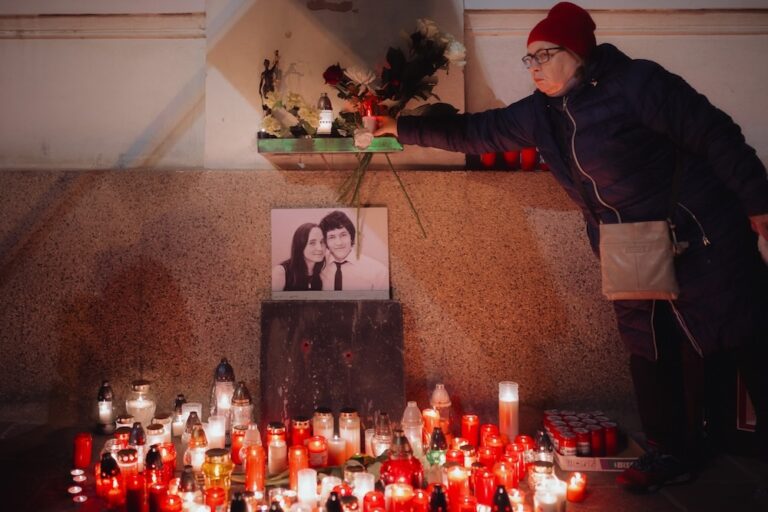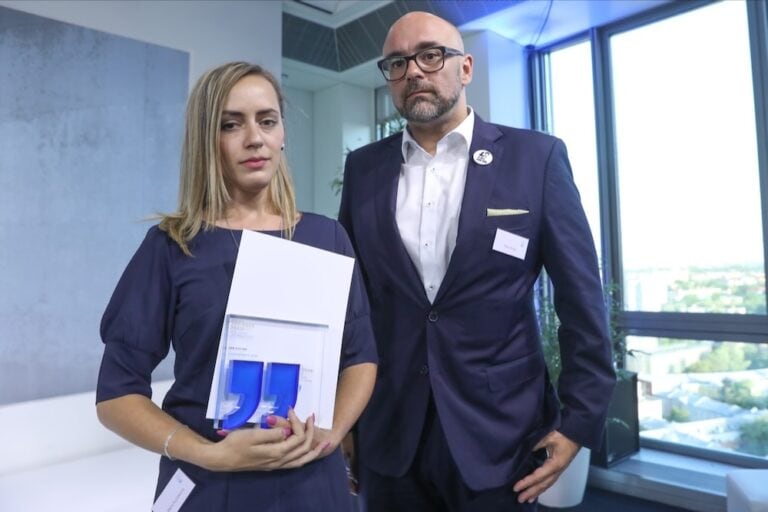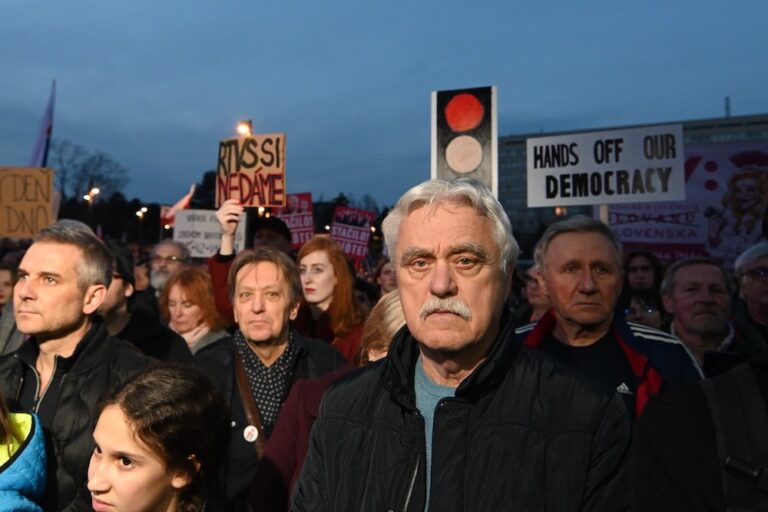(IPI/IFEX) – In a 21 September 1998 press statement, IPI says over the past few weeks, listeners to private Radio Twistâs news programmes have first been presented with a recorded apology issued by the General Director Andi Hryc. The statement announces that due to restrictive aspects of the Election Law, Radio Twist is legally forbidden […]
(IPI/IFEX) – In a 21 September 1998 press statement, IPI says over the past
few weeks, listeners to private Radio Twistâs news programmes have first
been presented with a recorded apology issued by the General Director Andi
Hryc. The statement announces that due to restrictive aspects of the
Election Law, Radio Twist is legally forbidden from presenting its listeners
with a full picture of political developments. Hryc, who has recently
received anonymous death threats, asks for his listeners’ understanding and
forgiveness, and promises to broadcast the truth in detail following the
election, by which stage the restrictions will be lifted.
**For background to some of the cases cited, see IFEX alerts of 20 August
1998 (Bacisin assault), 24 April 1998 (press legislation), 19 March 1998
(Korda/Nova TV), 15 October 1997 (Radio Twist)
Radio Twistâs difficulties serve to illustrate the kind of obstacles, both
legal and illegal, that the independent media face during a critical phase
in Slovakiaâs democratic development.
Parliamentary Elections
The people of Slovakia go to the polls on 25 and 26 September to elect a new
government. The current Prime Minister, Vladimir Meciar, has also held the
presidential powers since President Michal Kovac stepped down on 2 March.
The parliament has failed on six attempts to reach the three-fifths majority
the constitution requires to elect a new president. A recent opinion poll
indicated that support for Meciar’s ruling coalition currently hovers around
36 percent, compared with 58 percent for the four parties of the opposition.
However, Meciar’s Movement for a Democratic Slovakia (HZDS) party is still
the most popular party, and if it wins most votes, it will probably be given
the first try to form a government. The European Union, which excluded
Slovakia from the first wave of accession countries primarily because of
alleged failings in its democratic system, has stated that the handling of
these elections will be a key factor in considering Slovakia’s application
for membership.
Restrictive Election Law
The Election Law was controversially amended in May, permitting only the
state-funded media to broadcast activities relating to political campaigns
during the 30-day official campaign period. Additionally, it is prohibited
to publish the results of pre-election opinion polls for 14 days before the
election. The law also contains a provision for a 48-hour reflection period
before the election which is intended to prevent all members of the media
reporting on any political developments in the two days before the election.
This law, which in effect forces private TV and radio stations to ignore
many political developments in the pre-election period, has been widely
criticised both for its legal ambiguity and the fact that it will only allow
“election campaigning” or any coverage that might loosely be interpreted as
propaganda on state-owned broadcast media, which follows a strict pro-Meciar
line. A group of opposition parliamentarians have requested the
Constitutional Court to examine the Election Lawâs constitutionality.
Biased Media Coverage
Memo 98, an independent media monitoring group, strongly criticised
Slovakia’s state media for increasingly pro-government bias in the run-up to
general elections. “STV (Slovak Television) news has completely abandoned
any pretence of providing Slovak voters with fair, accurate or balanced
coverage of relevant political events,” the group concluded. During the
first two weeks of the election campaign, Slovak television had devoted 61
percent of news time to the government and its coalition parties compared
with 15.2 percent for the opposition. The comments were based on surveys of
the amount of time devoted to various parties during news programmes. Memo
98 also criticised Markiza TV, a popular private TV station with ratings for
news programmes approaching 70 percent, for pro-opposition bias. The survey
indicated that Markiza had devoted 32.8 percent of its news coverage to the
government and coalition parties and 41.9 percent to the four opposition
parties.
Markiza TV is reported to have strong links with the opposition Party of
Civic Understanding. In practice, Markiza TVâs leaning towards the
opposition parties provides a counterweight to STVâs pro-government
approach; an equilibrium of sorts which is upset when the Election Law is
applied.
The Slovak Syndication of Journalists announced in a statement that
“positive information on the work of the Slovak government and the governing
HZDS party prevail on the airwaves of the tax-payer driven STV. The STV has
given up its basic mission to serve the public.”
The Markiza Protests
In a flashpoint on 16 and 17 September, thousands of protesters gathered
outside the headquarters of independent television station Markiza, and in
18 cities and towns across Slovakia, to protest against what they saw as a
government effort to silence the critical voice of Markiza TV. The
protesters brandished placards stating “Markiza is equal to Democracy.” The
rallies were harnessed by the opposition parties to express anti-Meciar
sentiment. The tussle was, however, primarily an ownership battle over
Markiza Slovakia Comp. Ltd. which holds the licence to broadcast. The
previous owner and general director of TV Markiza, Pavol Rusko, had been
successfully sued by a former partner, who then in effect took legal holding
of the station. The partner passed the legal title on to Gamatex Comp. Ltd.,
a legal point which Rusko and Central European Media Enterprises (CME), the
49 percent minority shareholder, rejected but which was held up by the
courts. Gamatex’s first move was to fire Rusko, his wife — who was the news
editor — and other key members of the management. This decision was
apparently illegal as it should have been made in cooperation with CME.
Gamatex and CME are currently trying to reach an interim operating agreement
while the ownership issue is brought through an appeal process. Rusko, who
now believes he has reason to fear for his life, has left Slovakia.
The opposition parties claim that the change in ownership of TV Markiza so
close to the election amounted to an attempt by allies of Prime Minister
Meciar to interfere with the editorial line of the station. While this
allegation has not been substantiated, the legal proceedings in the
ownership issue were settled in a matter of days — a judicial process which
many observers felt was suspiciously quick. CME Director Jeff Silverberg
told IPI that if the manoeuvre was not politically motivated it represented
“a remarkable coincidence in timing,” coming just ten days before the
election and with recent opinion polls going against the ruling party.
Sources within the ruling Movement for a Democratic Slovakia (HZDS) party
stated that the matter was nothing but an internal legal ownership struggle
and had no impact on freedom of expression in Slovakia.
Fine for Campaign Broadcasting
In breach of the Election Law, Markiza TV broadcast live coverage of the
protest rallies over their two-day duration. Slovakia’s Radio and Television
Council ruled on 17 September that “Markiza violated both licence conditions
and the Election Law because opposition politicians appearing on the screen
conducted election campaigning.” Markiza was fined 3.5 million Slovak Crowns
($120,000) and ordered to broadcast three times a statement announcing that
in the view of the Council it had broken the Election Law. The Council is
made up of nine members who are named by parliament. Only two of the nine
current members were nominated by the opposition parties.
Radio Twist was also reprimanded by the Council for broadcasting a news
bulletin that reported that an opposition party had promised to amend or
rescind over 100 laws if elected. The court forced Radio Twist to broadcast
an announcement before its main news programme stating it had breached the
Election Law.
Alleged Smear Campaigns Against Journalists
The state news agency TASR recently published the names of 12 journalists it
alleged accepted money to publish partisan stories. The journalists in
question are currently in the process of suing the news agency. The Slovak
Syndication of Journalists (SSN) Secretary General Peter Zeman believes the
TASR report is “totally false and represents a calculated attempt to
discredit the journalistic profession in general in Slovakia in the run-up
to the election.”
In a separate incident, fly sheets accusing two journalists from Radio Twist
and Novy Cas of paedophile activity were posted in several public places.
Cases of Harassment and Violence Against Journalists
A climate of fear tends to accompany investigative journalists in Slovakia,
who regularly report acts or threats of violence against them, being
followed, and having their phones tapped.
Eugen Korda, Slovakia correspondent for the Prague-based TV station Nova
Television had his car seriously damaged by unidentified persons on 18 March
1998. His tires were slashed, the body work damaged, and the windows smashed
with an iron bar, which Korda found lying in front of his house door. Korda,
who is not popular among the supporters of the Slovak government, has been
harassed in the past. In a report to Parliament in 1995, the head of the
Slovak secret service (SIS), Ivan Lexa, mentioned a certain Eugen K. in
connection with what he called “anti-Slovak elements.” Korda’s previous car
was damaged three months before this incident, he has received threatening
phone calls, and he is regularly followed by unidentified persons.
In August 1998, Vladimir Bacisin, an investigative reporter at the private
business daily “Narodna Obroda”, was allegedly beaten by two policemen and
detained for several hours after he had crossed a street on a red light. The
reporter had just finished meeting with a source from the National Bank of
Slovakia. Bacisin believes he was targeted in retaliation for his
investigative reports revealing illegal practices by two private firms with
close links to the ruling coalition. Bacasin has subsequently been dismissed
by the editor of “Narodna Obroda”, Miroslav Tuleja, a well-known government
supporter.
Last year, the car belonging to “SME” journalist Petr Toth was torched by
unknown persons. Toth was investigating the 1995 kidnapping of former
President Michal Kovac’s son and the alleged involvement of the Slovakian
Intelligence Service (SIS) in the crime. In a controversial move since then,
Prime Minister Meciar granted an amnesty to all those involved in the 1995
kidnapping.
In March 1997, a bomb exploded in the car of Peter Licak, editor-in-chief of
daily newspaper “Presovsky Vecernik”.
Slovakiaâs Political Culture of Secrecy
Independent journalists regularly gripe about the culture of secrecy that
pervades in Slovakia, and the fact that freedom of information, despite
being constitutionally guaranteed, is not adequately protected by
legislation. Examples cited include: Prime Minister Meciarâs continued
refusal to hold press conferences; lack of transparency regarding the
privatisation of state-owned institutions; no media access to the monthly
HZDS meeting; and heavily restricted media access to
parliament.
Conclusion
In view of the many ways the independent media are impeded in their work and
the obvious pro-government bias of the state-run media, it is difficult to
see how the electorate can obtain a full picture of political developments
in the run-up to the parliamentary elections.
For the most part, the printed press in Slovakia is free. Recent attempts to
increase the VAT [value-added tax] rate on publications from 6 to 23
percent, which would have rendered many papers financially unstable, have
been argued down following a wave of domestic and international pressure. As
Slovak law does not require media owners to disclose their holdings,
speculation over hidden agendas and partisan publishing is rife. The basic
law governing the printed press, which dates back to 1966 and contains
amendments from 1990, still contains many outdated elements. Since 1990, no
less than 16 new draft press laws have been prepared but not one has yet
been discussed in parliament.
The electronic media continues to be heavily restricted, resulting in
political repercussions as studies indicate that the great majority of the
Slovak people rely on TV and radio for news. To achieve maximum coverage,
radio stations are compelled to use the transmission towers owned by
state-run Slovak Telecommunications. In 1996, independent broadcasters were
charged 130 percent more for these services than was stipulated in their
contracts. Radio Twist’s broadcasts have been interrupted several times by
vandalism, power cuts and once over a bill apparently owed to authorities
which the station’s management insisted was already paid before their
transmission was disconnected for 25 hours.
The Election Law ironically, but perhaps not accidentally, seeks to deprive
the electorate of political coverage at a time when they need it most to
enable them to make informed decisions. Fines, such as the one handed out to
Markiza TV for covering a protest rally, may well be in compliance with the
current legislation. However, the legislation is in IPIâs view
unconstitutional and contravenes Slovakiaâs obligations under international
law.
Cases of violence and harassment against the media — both by members of the
police and intelligence service, and by unidentified persons — have a
chilling effect on the press, and as a direct consequence, on the
development of the society as a whole. The impunity that meets these crimes
should not be allowed to continue.
The International Press Institute expresses solidarity with its Slovakian
colleagues who are operating with impressive professionalism under difficult
circumstances and calls on the Slovak authorities to fully respect the
fundamental principles of a free press and to ensure that all barriers to
freedom of expression in Slovakia are removed.


